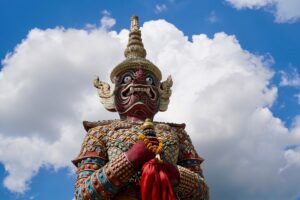The debacle of Argentina’s blocked bond payment reminds me of Edward Moor’s description in his ‘The Hindu Pantheon’ of the Hindu deity, Kuvera. This deity seems to be the patron saint of Chief Justice Roberts, Judge Thomas Grieva, Elliot Management Corporation, and Aurelius Capital Management. Apparently, American courts are possessed by the spirit of Kuvera.

Capitalist Manipulation
Argentina will miss a bond payment today thanks to a U.S. court. Argentina had the funds set aside to make this payment. However, when Argentina transferred them to the bond trustee, a U.S. District Court judge, Thomas Griesa, ordered the payment sent back. He stated that his ruling will allow the parties to ‘negotiate’. What it will most certainly do is keep the scheduled payments from interfering with the vulture capitalists’ windfall—the windfall granted to hedge funds last week courtesy of our very own Chief Justice Roberts. Grieva’s ruling marks the first time in history a judge has prevented a country from paying a restructured bond holder.
Edward Moor
“Kuvera, the regent of wealth, for a moment demands our attention; and although few people seek the favor of this deity with greater avidity than the Hindus, yet I find but little mention of him in my mythological memoranda; nor have I any image or picture of him…On Kama, Lakshmi, or Saraswati, poets and historians dwell with complacency and delight; but the gloomy, selfish, and deformed Kuvera, claims not, nor deserves, so much of our attention….
“His servants and companions are the Yakshas and Guhyakas, into those forms transmigrate the souls of those men who in this life are addicted to sordid and base passions, or absorbed in worldly prosperity. The term Guhyaka is derived from Guh (ordure), a word retained in several dialects: hence Guhya… We happily do not find that the regent of wealth is related in marriage or otherwise with Lakshmi, the goddess of riches, to whom a Hindu…would address himself for that boon, and not to Kuvera: he has, however, a Sacti, or consort, named Kauveri, whence I conjecture, the river of that name, in Myhsore, derives its appellation.”
Rabinranath Tagore had similar things to say about Kuvera:
“Those who are familiar with the Hindu Pantheon know that in our mythology there is a demi-god named Kuvera, similar in character to Mamon. He represents the multiplication of money whose motive force is greed. His figure is ugly and gross with its protuberant belly, comic in its vulgarity of self-exaggeration. His is the genius of property that knows no moral responsibility. But the goddess, Lakshmi, who is the Deity of Prosperity, is beautiful. For prosperity is for all. It dwells in that property which, though belonging to the individual, generously owns its obligation to the community. Lakshmi is seated on a lotus, the lotus which is the symbol of the Universal heart. It signifies that she presides over that wealth which means happiness for all men, which is hospitable.
“By some ill-luck, Lakshmi has been deprived of her lotus throne in the present age, and Kuvera is worshipped in her place. Modern cities represent his protuberant stomach, and ugliness reigns unashamed. About one thing we have to be reminded, that there is no cause for rejoicing in the fact that this ugliness has an enormous power of growth and that it is prolific of its progeny. Its growth is not true progress; it is a disease which keeps the body swelling while it is being killed.” ((Tagore, Rabindranath, The English Writings of Rabindranath Tagore: A miscellany. Sahitya Akademi, 1996))